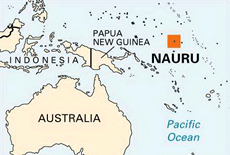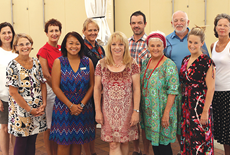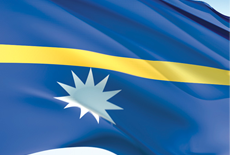Queensland Catholic teachers are providing their skills and support to children in need in Nauruan schools. IE Journalist Fiona Stutz looks at a new project enhancing both teacher and student learning in these schools.
Reports of refugee and asylum-seeker children in Nauru and the harsh conditions they allegedly face often makes the news. The opportunity to participate in mainstream education with local Nauruan children was considered essential and necessary to a group of Brisbane Catholic archdiocese teachers who worked in Nauru to enhance children’s literacy skills throughout Term 1 this year.
Queensland Catholic Education Commission (QCEC) and Brisbane Catholic Education (BCE) were invited by the Commonwealth Department of Immigration and Border Protection to develop and deliver a range of supports to the Nauruan education system to assist with the integration of refugee and asylum seeker children into local schools.
Their response included deployment of a small group of teachers to provide classroom based curriculum support in Nauruan schools focusing on English as a Second Language (ESL) in three schools: Nauru Secondary School, Nauru College and Kayser College.
Manager of the Nauru Project, Denis Anthonisz, said the commitment from the teachers was to help both Nauruan and refugee children to improve their literacy and to strengthen local teachers’ ESL skills.
“The children have a lot of needs, because English is a second language, both for the refugees and for the Nauruan children, and we can be of great help to both the teachers and to the children. The relationships formed with the Nauruan staff have enhanced teacher professional capacity in these schools and enhanced the learning of all students in these schools,” Denis said.
Facing challenges
While the Nauru Government provides the students with a free education, which includes textbooks, exercise books and lunch, difficult internet access results in limited computer use in schools. However, he commended the BCE teachers for their willingness and capacity to teach literacy and numeracy to the children, considering the facilities and challenges they faced.
Denis highlighted the differences in teaching children in Australian compared to children in Nauru.
“In Australia fewer children have significant literacy and numeracy needs; in Nauru, most of the children do.”
With more than 40 years of teaching experience and as a Principal in schools, Denis admits visiting Nauru to help in educating the children there was “the most challenging and the most rewarding experience I have ever been involved with.”
BCE Education Officer Languages Bernadette Barker provided professional development in ESL for the teachers prior to arriving in Nauru and on a continual basis while there. During her first visit to the country she led the language assessment team who assessed the refugee and asylum seeker students in English language proficiency to help provide information to the local schools about the students to best support their learning.
With education in Nauru taught in an ESL context, the curriculum sets out that students in Year 1 receive only 15% of their instruction in English. It is not until Year 10 that classes are conducted entirely in English, Bernadette said.
“However, there are classrooms where the teacher is not a native Nauruan so rather than the classroom being bilingual it is an ESL/EFL classroom. There is a wide range of achievement in both English and mathematics in all classrooms. This consideration means that teachers need to utilise strategies that will support all students’ learning.”
Building on experience
Bernadette Barker said teachers needed to be resourceful in using what was available at the schools.
“Laptops and electronic whiteboards that teachers would use widely here (in Australia) are not a feature of classrooms in Nauru. So it is important that teachers think carefully about what resources they can use and which strategies they can utilise to support students to learn English and the content of the subject areas. Using very practical strategies consistent with English language teaching pedagogy such as Language Experience and building on the prior knowledge of students are vital strategies.”
St Patrick’s Primary School teacher Damien Lynch was one of the teachers who took part in the project this year. The Gympie teacher taught in the primary and middle schools, assisting the local teachers by upskilling them and modelling different teaching.
“Resources were limited. We were forced to get creative and make the most of what we had,” Damien said.
With more than 19 years teaching in Australia, England, Thailand, Canada and Fiji, Damien said that although the work was challenging, he found many positives to teaching in Nauru, including meeting and working with the locals and learning about the Nauruan culture and history.
“It was rewarding making a difference for the students, teachers and education system in Nauru.”
St Francis Xavier School Goodna teacher Courtney Hill said she was excited to be involved in the project as she enjoyed immersing herself in different cultures and working with students from different countries.
“I enjoyed working and socialising with the local teachers and students. There was so much respect and appreciation that the families showed towards us. Spending time outside of the classroom listening to the locals and refugees tell their stories was a great experience,” Courtney said.
She said she packed “whatever we could fit in our suitcase” for the eight-week experience.
“I took handwriting books for Year 2 and 100 pencils. These came in very handy. We also took over some great picture books which the students loved.”
Courtney is now back in Australia working at her primary school, but admits she would love the opportunity to visit Nauru again.
QCEC executive director Mike Byrne said the teachers’ involvement was an opportunity for Catholic education to assist Nauru and all school children in a practical way.
However, it was made clear to the Federal Government that this should not be seen as support for the Government’s asylum-seeker policy of offshore processing.
A further group of teachers are taking up the program in Term 2 at two additional schools: Yaren Primary School which teaches Years 1 to 3, and Nauru Primary School which teaches Years 4 to 6.
BCE Executive Director Pam Betts said the initiative would move forward in carefully managed stages and in close cooperation with the Nauru Education Department to ensure “we provide the skills and support that meets the children’s needs and is in keeping with existing plans and structures.”










































































































































